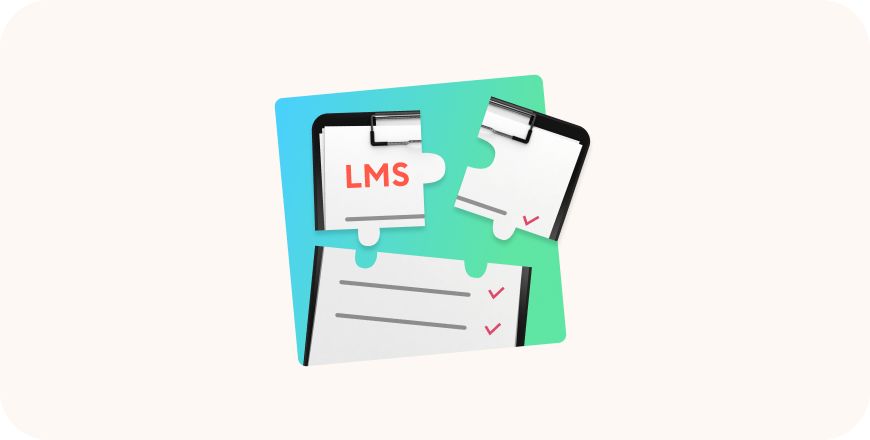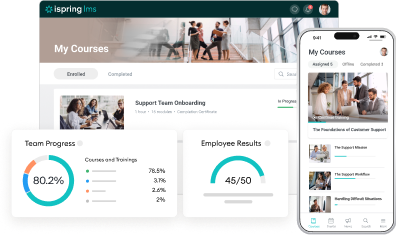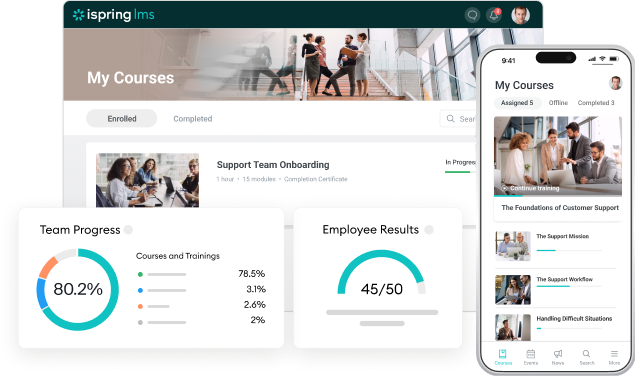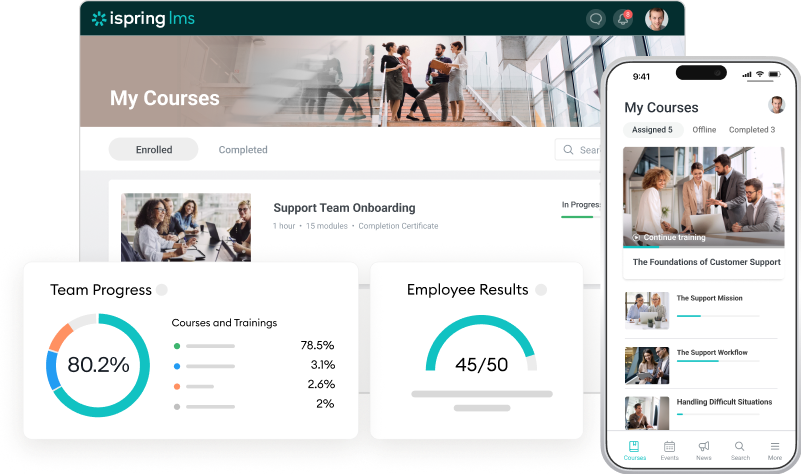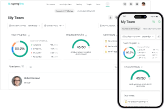12 Benefits of a Learning Management System

The functionality and benefits of a learning management system (LMS) go far beyond delivering and managing eLearning or corporate online training. An LMS can empower the cross-functional approach required to truly embrace diversity, equity, and inclusion. It can provide the collaborative, human-centric, and development-focused culture essential to attracting and retaining the top talent that’s vital to taking your business to the next level.
In this article, we outline twelve benefits of an LMS, gleaned from feedback sent by iSpring clients, including examples received from recruiters, HR directors, sales and commercial directors, and retail managers.
12 Benefits of Learning Management Systems
First, the benefits of a learning management system for preboarding, onboarding, improving the HR brand, and upskilling and empowering non-HR hiring managers.
Streamline onboarding
With learning management systems, remote onboarding can be an effective online learning process that new hires can complete independently, leaving managers more time to spend on value-adding in-person training or their own roles.
By onboarding with one of the top learning management systems, new hires can visualize all their employee training materials and progress, and feel confident in an organized, comprehensive learning process. HR teams and managers can see a learner progress on their LMS dashboard in a way that’s far less intrusive than chasing down paperwork or questioning a nervous new starter. Detailed LMS records and notifications mean that leaders can action incomplete documents appropriately and can quickly discover if there is a lack of commitment from a new hire.
Provide effective preboarding
Some recruiters think that adopting a preboarding strategy powered by an online learning management system that provides documents remotely allows new hires to confidently “hit the ground running.” Introductory training courses, orientation, health and safety, and company culture documents delivered before an employee’s start day help the new hire to be more prepared and less nervous on their first day.
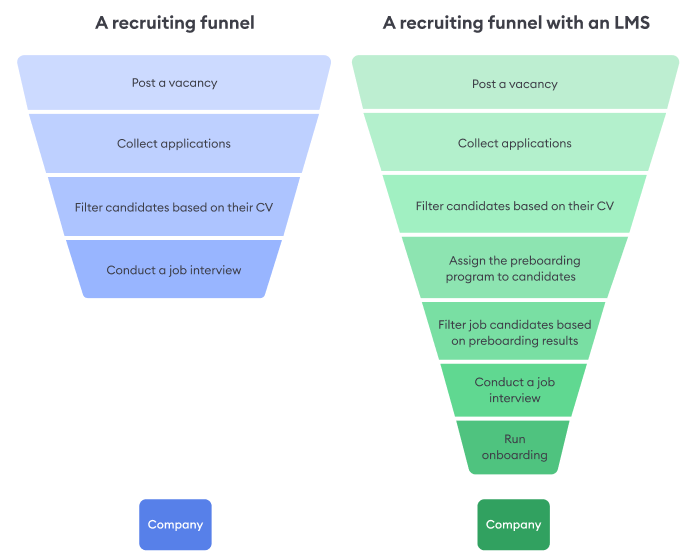
Improve your HR brand
Having hiring processes in order with a robust, impressive system improves the HR brand of your company and creates a great first impression with new hires. Learning management systems give new employees tools that help them work effectively immediately, making them more productive and feeling that they’re of immediate value. Moreover, they’ll likely share their positive experiences with friends and on social media.
Enable non-HR hiring managers
But what if HR creates a great first impression at an interview or during an employee’s first days, but managers don’t carry that forward? What if technical leaders who are untrained in interview techniques fail to draw out the key answers they need from potential candidates?
A learning management system facilitates training for supervisors and managers, especially if they’re new to interviewing, hiring, and onboarding. You can use a learning management system to assign supervisors a short training program or a guide, or share HR best practices on a platform they can easily access at any time during their workday. You can even add an online quiz that assesses if managers have learned the vital information required to evaluate resumes and candidates effectively.
Next, we will cover the advantages of a learning management system for building new hires’ knowledge, providing at-your-fingertips awareness of team qualifications, assessing soft skills, and testing for compliance.
Create a Knowledge Base of Best Practices
Another advantage of an LMS is its functionality as a repository of the company’s best practices and as a knowledge base. Departments and skilled employees can share their valuable expertise permanently, rather than only on occasional and costly training days.
All this knowledge can be packed into training modules and programs that are uploaded to an LMS and assigned as part of the development process for other employees or simply used to foster a collaborative culture. This guarantees that expertise and best practices remain with a company, even if a key or influential employee leaves. Ultimately, it is one of the great benefits of learning management system adoption for companies of any size.

Visualize team qualifications
Learning management systems can record employees’ qualifications and experience, and this record is updated every time a training program, document, webinar, quiz, or even a one-to-one session is completed using the LMS.
Employees’ strengths are readily visible to company leaders, allowing decision-makers to mobilize talent or identify potential promotions internally. Conversely, an LMS can reveal employees who require training programs or whose skill sets are in short supply, allowing managers to formulate training needs. Training metrics can also be linked to your bonus system, allowing you to fill this blind spot with objective data.
Assess soft skills
The advantages of using learning management systems to improve technical and hard job skills are immense. These can be evaluated quickly through quizzes and tests.
The most effective way to assess soft skills in recent years has been to conduct a 360-degree performance appraisal review to survey everyone interacting with a particular employee about their soft skills. Typically, this evaluation method is resource intensive and can take months.
Some of the best learning management systems, like iSpring LMS, come with a built-in
360-degree feedback assessment module. They let you streamline this process and complete it within a day, giving you an illustrative competency radar chart for each employee that shows their strengths and weaknesses clearly.
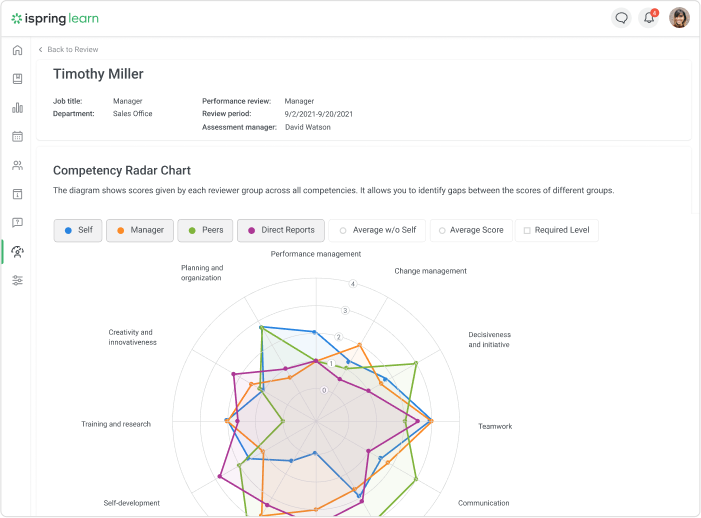
Based on the results, you can plan activities via the LMS to develop competencies that are lacking.
Say the marketing department shows low results for creative thinking. You can then plan a series of training sessions to get this department back on track. Your LMS will record the progress of these employees in their training and in future evaluations and job performance, providing you with an accurate picture of your ROI from this initiative.
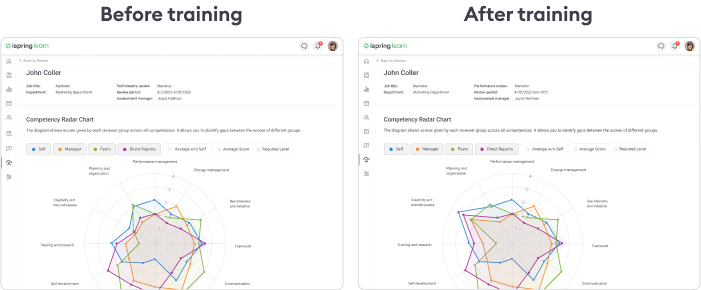
Test employee knowledge
One of the great benefits of using a learning management system is the ability to create and manage interactive and engaging assessment tools easily.
You can go further than online quizzes with more formal tests and exams, issue multiple-choice assessments, or even create games that help you glean a benchmark of your employee knowledge.
Gamification is a great way to engage employees with learning materials. This feature is available in the best learning management systems, allowing you to incentivize employees to participate in or join a friendly competition with their peers.
In a sales environment in which employees are motivated by bonuses and commissions, you can use your LMS to test product knowledge. You can also reward team members who go the extra mile to understand the features and benefits of what they are selling.
Now, we’ll look at the benefits of an LMS for employee development, upskilling, and best practice sharing.
Train or role-play team skills
Roles like sales have a high turnover rate, affecting overall revenue generation when new salespeople need more skills, knowledge, or even an understanding of the brand voice you want to convey.
The benefits of a training management system mean you can train in interactive role-plays based on real-life cases, e.g., facing impatient, dissatisfied, or angry customers and other common role-playing scenarios for customer service and sales. See how this exercise can look:
You can monitor a sales employee’s training progress in an LMS, including their performance in role plays on overcoming objectives, and know with certainty when an employee is ready to interact with your customers effectively.
Share best practices
An LMS is extremely helpful for creating a corporate repository of knowledge. Take the example of the sales team again; you will have strong performers and weaker ones. An LMS can help you identify where and how your strongest people are successful and allow you to record this and turn it into new training material to share these best practices and improve your weaker employees.
For example, one of our clients set up a research team that observed the sales department that had the highest conversion rate. They kept an eye on the salespeople, wrote down everything they did, and then packed it into online courses with interactive role-plays and assigned them to employees in other sales departments. As a result, they landed more deals and increase the company’s overall revenue substantially.
A significant advantage of learning management software is its ability to increase revenue generation by distributing best practices. You don’t have to drive across the country, move trainers from one office to another, or manually check employee progress. You can simply glance at your LMS dashboard and see who completed the assigned training and exactly how they performed.
Read also: Most Important LMS Reports
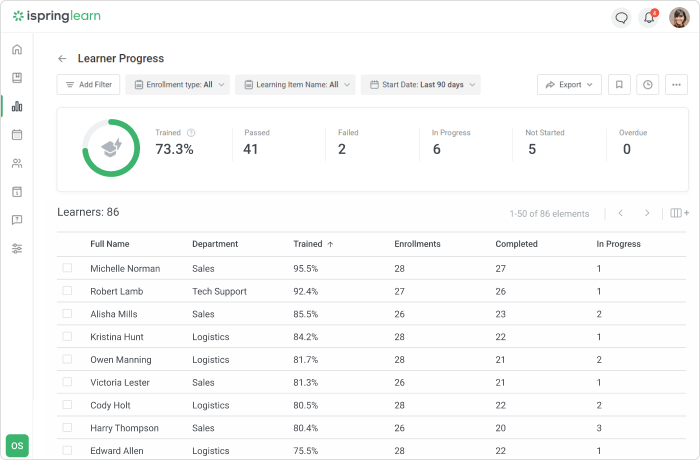
Lastly, taking your LMS benefits further: advantages for robust business growth.
Facilitate cross-functional collaboration
Departments often work in silos, each with their own tasks and campaigns to build products, serve customers, and generate revenue. A disconnect between your development and technical teams and your marketing professionals, for example, could reduce the effectiveness of both.
Marketing professionals who understand a product or service from the ground up can represent it far better to customers. On the flip side, technical, product, or customer service teams can be motivated by understanding the efforts of marketing or sales teams to grow a business. Here’s another example: if salespeople don’t understand all the details of a marketing campaign or promotion, they won’t feel comfortable offering that deal to customers.
With an LMS, marketers can prepare training programs on the campaign’s offer and add a knowledge check to see how well salespeople absorbed the terms. This way, marketers are confident the campaign will be accurately represented and pushed by sales, and salespeople will be able to increase their conversion rate by offering an appealing deal.

Educate customers and partners
Perhaps your product is part of another company’s proposition, or you have a complex product for which customers need training to optimize their ROI. Educating customers and partners face-to-face can be costly, or it simply might not be possible to scale this essential service across the country or worldwide.
An LMS allows you to develop your product training only once, upload it to the LMS, and then simply give your customers or partners access to the training courses. Even if you update your product and some training materials become outdated, you can easily update those blocks with new information. This is much cheaper than redesigning and reprinting brochures every time. For example, Triad Unlimited’s customers potentially save over $200,000 thanks to their online training powered by iSpring LMS and iSpring Suite.
Final Thoughts on the Benefits of an LMS
A high-performance cloud-based learning management system is a powerful tool that can streamline hiring and onboarding, attract and retain talent, train and motivate employees, and facilitate a company culture of learning, transparency, and inclusion.
An LMS saves time and money spent on recruiting and HR processes, and provides a clear picture of an internal talent pipeline, allowing skill gaps to be addressed.
If you’d like to know more about the benefits of an LMS for your business, reach out to schedule a free live demo with the expert iSpring LMS team.
